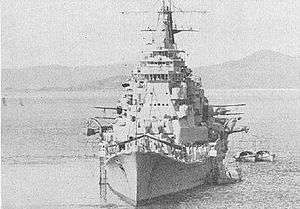8th Fleet (Imperial Japanese Navy)

The IJN 8th Fleet (第八艦隊 Dai-hachi Kantai) was a fleet of the Imperial Japanese Navy (IJN) established during World War II.
History
Established on 14 July 1942, the IJN 8th Fleet was a headquarters unit established to direct Japanese naval operations in the Solomon Islands and New Guinea. The warship forces assigned to the 8th Fleet were known as the Outer South Seas Force and Vice Admiral Gunichi Mikawa was assigned as the first commander.[1]
The first warships assigned to the 8th included the heavy cruiser Chōkai, Cruiser Division 6 (CruDiv6) which included the heavy cruisers Aoba, Kinugasa, Kako, and Furutaka, light cruisers Tenryū and Yubari, and four destroyers. On July 26, Mikawa, with his flag on Chōkai, led the force from Truk to Rabaul, New Britain where he established his headquarters. He detached CruDiv6 to Kavieng, New Ireland.[2]
The IJN 8th Fleet under Mikawa engaged Allied forces in the Battle of Savo Island on August 8–9, 1942. In the battle, Admiral Mikawa's 8th Fleet defeated a numerically-superior allied force ('Task Force 62.2', composed primarily of United States Navy vessels, but with a substantial Royal Australian Navy component, all under the command of British Rear Admiral Victor Crutchley VC) and sank four of the eight cruisers present, but failed to follow through and destroy the lightly protected American transports that had just landed troops on the island, initiating the Guadalcanal Campaign.[3]
The IJN 8th Fleet also played a major role in the Naval Battle of Guadalcanal from November 12–18, 1942, during which the Japanese won a tactical victory, but suffered a strategic defeat due to large losses of irreplaceable ships and an inability to enable the delivery of sufficient army troops to retake Guadalcanal from Allied forces. The 8th Fleet subsequently played a major role in Operation Ke, the successful withdrawal of army forces from Guadalcanal the first week of February, 1943 that conceded victory to the Allies in the hard fought campaign.
From December 20, 1942, until the end of the war, the IJN 8th Fleet came under the operational authority of the Southeast Area Fleet. Its headquarters staff was later isolated on Bougainville Island with remnants of Imperial Japanese Army forces at the end of the war.
Commanders of the IJN 8th Fleet
Commander in chief[4]
| Rank | Name | Date | |
|---|---|---|---|
| 1 | Vice-Admiral | Gunichi Mikawa | 14 Jul 1942 – 1 Apr 1943 |
| 2 | Vice-Admiral | Baron Tomoshige Samejima | 1 Apr 1943 – 3 Sep 1945 |
Chief of staff
| Rank | Name | Date | |
|---|---|---|---|
| 1 | Vice-Admiral | Shinzo Onishi | 14 Jul 1942 – 1 Apr 1943 |
| 2 | Rear-Admiral | Teijiro Yamazumi | 1 Apr 1943 – 3 Sep 1945 |
References
Books
- Coombe, Jack D. (1991). Derailing the Tokyo Express. Harrisburg, PA: Stackpole. ISBN 0-8117-3030-1.
- D'Albas, Andrieu (1965). Death of a Navy: Japanese Naval Action in World War II. Devin-Adair Pub. ISBN 0-8159-5302-X.
- Dull, Paul S. (1978). A Battle History of the Imperial Japanese Navy, 1941–1945. Naval Institute Press. ISBN 0-87021-097-1.
- Evans, David C. (1986). "The Struggle for Guadalcanal". The Japanese Navy in World War II: In the Words of Former Japanese Naval Officers (2nd ed.). Annapolis, Maryland: Naval Institute Press. ISBN 0-87021-316-4.
External links
- Bullard, Steven (translator) (2007). Japanese army operations in the South Pacific Area New Britain and Papua campaigns, 1942–43. Senshi Sōshō (translated excerpts). Canberra: Australian War Memorial. ISBN 978-0-9751904-8-7.
- Nishida, Hiroshi. "Imperial Japanese Navy". Archived from the original on 2013-01-30. Retrieved 2007-02-25.
- Wendel, Marcus. "Axis History Database". Retrieved 2007-02-25.